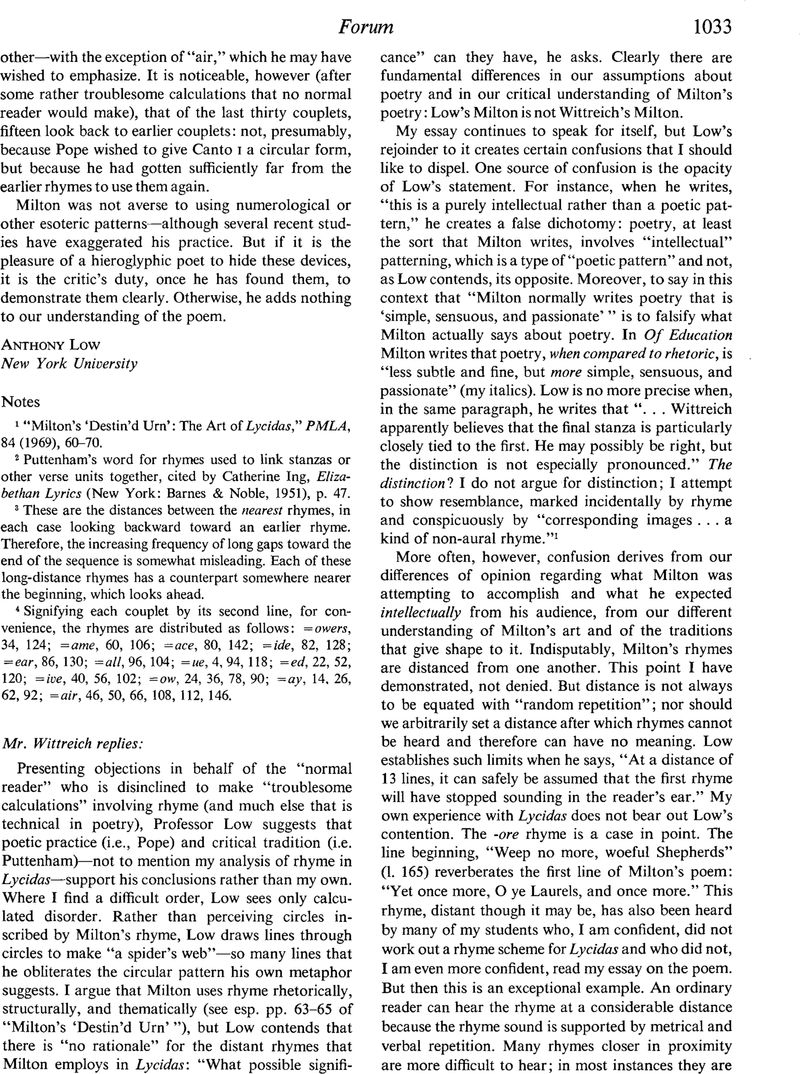No CrossRef data available.
Published online by Cambridge University Press: 01 December 2020

Note 1 in page 1035 I quote from Denise Levertov, “Some Notes on Organic Form,” Poetry, 106 (1965), 422. The entire essay, but especially the paragraph from which this quotation is taken, pertains to my discussion of Lycidas.
Note 2 in page 1035 Joseph H. Summers comments importantly: see George Herbert: His Religion and Art (London: Chatto and Windus, 1954), pp. 90–92.
Note 3 in page 1035 New Memoirs of the Life and Poetical Works of Mr. John Milton (London, 1740), p. 32.
Note 4 in page 1035 E. K., “[The Epistle Dedicatory to The Shepheards Calender],” in Elizabethan Critical Essays, ed. G. Gregory Smith (Oxford: Clarendon, 1904), i, 128.
Note 5 in page 1035 The first quotation is from Samuel Daniel, A Defence of Rhyme, in Elizabethan Critical Essays, ii, 366; the second from George Puttenham, The Arte of English Poésie (1589; rpt. London: R. Triphook, 1811), p. 73.
Note 6 in page 1035 Puttenham, pp. 68, 71–72.
Note 7 in page 1035 Henry Reynolds, Mythomystes, in Critical Essays of the Seventeenth Century, ed. J. E. Spingarn, i (Oxford: Clarendon Press, 1908–09), 156, 159, 172; and Edward Phillips, “Preface to Theatrum Poetarum,” in the same work, ii, 257. Also pertinent are Milton's comments on “crypsis of method” in Artis Logicae (Columbia Milton, xi, 485) and on Christ's use of the method in The Doctrine and Discipline of Divorce (Yale Milton, ii, 308, also pp. 310, 338.)
In my formal response to Professor Low's rejoinder, I have focused on our different comprehensions of Milton's poem; but I do not wish to conclude this exchange without directing attention to Low's claim that “rhyme in a long poem is bound to repeat itself, since there are only so many convenient rhyme sounds in English.” Such a claim greatly underestimates the rhyme potential of the English language, and this point the first 193 lines of Paradise Lost illustrate. Working out a rhyme scheme for those lines in the same way that I worked out one for Lycidas, I find in lines 1–100 thirteen rhymes that involve only twenty-six of those lines (seventy-four lines are unrhymed). In the next ninety-three lines there is a good deal of “random repetition”; but despite it there are in ll. 1–193 roughly seven times the number of unrhymed lines that Low finds in Lycidas (he accepts, I assume, the commonplace notion that there are ten unrhymed lines in the poem). I can only conclude that if Milton was truly concerned with “avoiding repetitions” in Lycidas he could have done so as easily here as he does in Paradise Lost. Furthermore, this conclusion is encouraged by the revisions in the Trinity MS, which reveal a desire to perfect the poem's rhyme. The substitutions of lament, sent, and shore (ll. 60, 62, 63) for son, bee, and lee are especially significant; so is the deletion of “fam'd” from line 85, which allows the line to end with “flood.” Had Milton not made this last substitution, he would have had in “fam'd” a word that has no rhyme in Lycidas (a curious deletion if we accept Low's hypothesis that, to the extent that his rhyme-impoverished language allows, Milton deliberately eschews rhyme in Lycidas). Note, too, the substitution of use for do at the end of 1. 67 and the insertion of “in the blest kingdoms of Joy, and Love” after 1. 176 in both the British Museum and Cambridge Univ. copies of Lycidas. See John Milton's Complete Poetical Works, ed. Harris Francis Fletcher, i (Urbana: Univ. of Illinois Press, 1943), 349, 352, 437, 439.